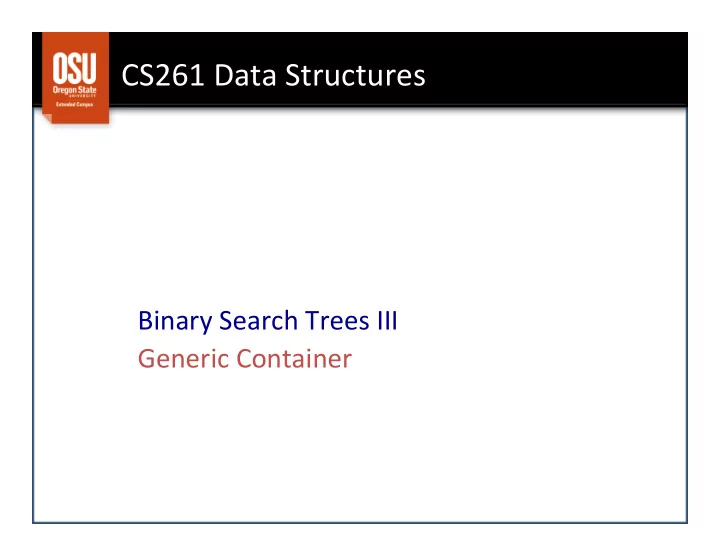

CS261 ¡Data ¡Structures ¡ Binary ¡Search ¡Trees ¡III ¡ Generic ¡Container ¡
Goals ¡ ¡ • void ¡* ¡ • compare ¡func?on ¡
Generic ¡Storage ¡ #ifndef __DYNARR_H #define __DYNARR_H # define TYPE int # define TYPE_SIZE sizeof(TYPE) # define LT(a, b) ((a) < (b) # define EQ(a, b) ((a) == (b)) ... /* Rest of dynarr.h (on next slide). */ #endif
struct Node *_addNode(struct Node *cur, TYPE val){ struct Node *newnode; if (cur == NULL){ newnode = malloc(sizeof(struct Node)); assert(newnode != 0); newnode->val = val; newnode->left = newnode->right = 0; return newnode; } if (LT(val, cur->val)) cur->left = _addNode(cur->left,val); else if (GT(val, cur->val) || EQ(val, cur->val)) cur->right = _addNode(cur->right, val); return cur; } Problem: ¡ ¡must ¡ ¡recompile ¡our ¡data ¡structure ¡if ¡we ¡change ¡the ¡type! ¡ ¡
Generic ¡Storage ¡Alterna?ve ¡ • Write ¡your ¡structure ¡to ¡store ¡void ¡* ¡ – generic ¡pointer ¡type, ¡indicates ¡absence ¡of ¡ ¡a ¡type ¡ – any ¡pointer ¡can ¡be ¡cast ¡to ¡ ¡void* ¡and ¡back ¡again ¡ without ¡loss ¡of ¡informa?on ¡ • Require ¡that ¡the ¡user ¡tell ¡us ¡how ¡to ¡‘compare’ ¡ the ¡elements ¡that ¡they ¡are ¡actually ¡storing! ¡ – compare ¡works ¡on ¡void ¡* ¡ – casts ¡them ¡to ¡actual ¡types! ¡
Generic ¡Storage ¡ #ifndef __DYNARR_H #define __DYNARR_H # define TYPE void * ¡ ¡ ¡ ¡ ¡/* ¡func?on ¡used ¡to ¡compare ¡two ¡TYPE ¡values ¡to ¡each ¡ ¡ ¡ ¡ ¡ ¡ ¡ ¡ ¡ ¡ ¡ ¡ ¡ ¡other, ¡define ¡this ¡in ¡your ¡compare.c ¡file ¡ ¡ ¡ ¡ ¡ ¡ ¡ ¡0 ¡Iif ¡ ¡l ¡=r ¡ ¡ ¡ ¡ ¡ ¡ ¡ ¡-‑1 ¡if ¡l ¡< ¡r ¡ ¡ ¡ ¡ ¡ ¡ ¡ ¡1 ¡if ¡l ¡> ¡r ¡*/ ¡ ¡ int ¡compare(TYPE ¡le2, ¡TYPE ¡right);
Add ¡with ¡Void ¡Pointers ¡ struct Node *_addNode(struct Node *cur, TYPE val){ struct Node *newnode; if (cur == NULL){ newnode = malloc(sizeof(struct Node)); assert(newnode != 0); newnode->val = val; newnode->left = newnode->right = 0; return newnode; } if (compare(val,cur->val) == -1) cur->left = _addNode(cur->left,val); else if (compare(val, cur->val) == 1) cur->right = _addNode(cur->right, val); return cur; }
BST ¡Add: ¡ ¡Usage ¡ void addBSTree(struct BSTree *tree, TYPE val) { tree->root = _addNode(tree->root, val); tree->cnt++; } … /* somewhere in main*/ struct data { int val; char *name; } struct data myData; myData.val = 4; myData.name = “dataName”; … add(myTree, &myData);
Usage ¡with ¡Void ¡Pointers ¡ /* somewhere in main…or a header */ int compare(TYPE left, TYPE right) { struct data* data1; struct data* data2; data1=(struct data*)left; data2=(struct data*)right; if (data1->number < data2->number) return -1; else if (data1->number > data2->number) return 1; else return 0; }
Summary ¡– ¡Generalizing ¡your ¡Data ¡ Structures ¡ • Use ¡void* ¡as ¡the ¡type ¡of ¡stored ¡elements ¡ • Require ¡that ¡the ¡user ¡provide ¡a ¡compare ¡ func?on ¡ • Even ¡Be\er: ¡ ¡Pass ¡the ¡compare ¡func?on ¡in ¡ with ¡a ¡pointer ¡to ¡a ¡func?on!! ¡
Recommend
More recommend